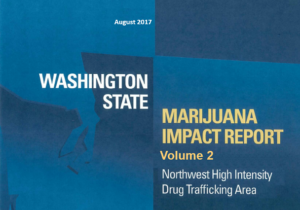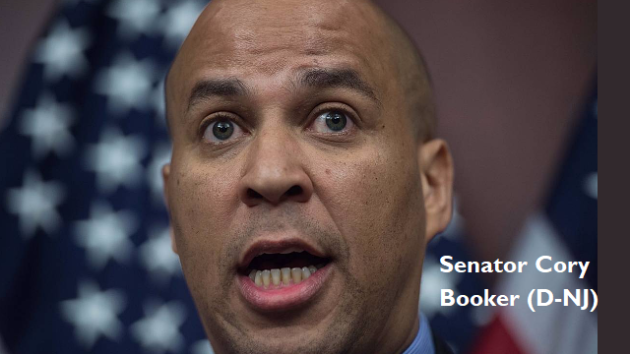Legalizing Pot Is a Bad Way to Promote Racial Equality
Two opinion pieces published this week, today in the Wall Street Journal and Monday in USA Today (see next story), challenge one of the marijuana lobby’s favorite assertions, advanced by Senator Cory Booker as the basis for a federal marijuana legalization bill he introduced last week.
Senator Booker’s bill, the Marijuana Justice Act, would encourage states to legalize pot for recreational use and withhold federal funds from those that don’t but incarcerate “low-income individuals and people of color for marijuana-related offences.” The senator says he believes nationwide legalization will end the racial disparity in US drug arrests.
Jason L. Riley, Wall Street Journal editorial board member, refutes this assertion. “Violent offences, not drug offences, drive incarceration rates, and blacks commit violent crimes at seven to 10 times the rate whites do,” Riley says. “Data from 2015, the most recent available, show that about 53 percent of people in state prisons (which house nearly 90 percent of the nation’s inmates) were imprisoned for violent crimes, 19 percent for property crimes, and just 16 percent for drug crimes.”
He says altering US drug laws would do little to change the racial make-up of people behind bars, adding that “marijuana offenders of any race occupy relatively few jail and prison cells, and the ones who do tend to be dealers.”
He quotes public defender James Forman who writes in his new book, Locking Up Our Own, “For every ten thousand people behind bars in America, only six are there because of marijuana possession.”
Read today’s Wall Street Journal editorial here.

Marijuana Devastated Colorado, Don’t Legalize It Nationally
USA Today opinion contributor Jeff Hunt, vice president of public policy at Colorado Christian University, also challenges the assertion that legalization will end racial disparities in the criminal justice system. He notes Coloradans heard similar promises in 2012 when citizens voted to legalize marijuana for recreational use.
He says black youth arrests for marijuana possession have increased 58 percent and Latino youth arrests have increased 29 percent since legalization, according to the Colorado Department of Public Safety. “This means that black and Latino youth are being arrested more for marijuana possession after it became legal,” he adds.
“In the years since,” he continues, “Colorado has seen an increase in marijuana-related traffic deaths, poison-control calls, and emergency-room visits. The marijuana black market has increased in Colorado, not decreased. And, numerous Colorado marijuana regulators have been indicted for corruption.”
Moreover, the state’s youth have the highest rate of marijuana use in the nation, 74 percent higher than the national average, he says.
“We’ve seen the effects in our neighborhoods in Colorado, and this is nothing we wish upon the nation,” he concludes.
Read USA Today opinion piece here.
Editorial note: The No More Drug War posters in the photo above are part of a campaign by the Drug Policy Alliance to legalize all illicit drugs. One of the organization’s platforms is based on its stated belief that Americans are guaranteed a constitutional right to use all addictive drugs, including heroin and methamphetamine.
71 Percent of All Substance Abuse Treatment Admissions for Youth Were for Marijuana in Washington State
 The Northwest High Intensity Drug Trafficking Area (NWHIDTA) has issued its second Marijuana Impact Report for the state of Washington since that state began implementing the recreational use of marijuana in July 2014. This massive report covers ten major areas; we highlight findings about youth here. Data for treatment admissions (above) pertain to the first quarter of 2016.
The Northwest High Intensity Drug Trafficking Area (NWHIDTA) has issued its second Marijuana Impact Report for the state of Washington since that state began implementing the recreational use of marijuana in July 2014. This massive report covers ten major areas; we highlight findings about youth here. Data for treatment admissions (above) pertain to the first quarter of 2016.
A few other highlights about youth include:
- Sixty percent of statewide student expulsions and 49 percent of suspensions related to substance abuse specifically involved marijuana during the 2014-2015 school year.
- Calls received by the Poison Center regarding marijuana-infused products increased 36 percent and calls involving marijuana oil increased 105 percent from 2014 to 2016.
- Seventy-three percent of Poison Center calls regarding children under ages five specifically referred to 1- to 3-year-olds.
We are unable to provide a link to this new report today but will publish one as soon as the report is posted to the Internet.
About the Marijuana Report
The Marijuana Report is a weekly e-newsletter published by National Families in Action in partnership with SAM (Smart Approaches to Marijuana). Visit our website, The Marijuana Report.Org, to learn more about the marijuana story unfolding across the nation.
SUBSCRIBE to The Marijuana Report.
SUBSCRIBE to Spanish edition of The Marijuana Report.
About National Families in Action (NFIA)
NFIA consists of families, scientists, business leaders, physicians, addiction specialists, policymakers, and others committed to protecting children from addictive drugs. Our vision is:
- Healthy, drug-free kids
- Nurturing, addiction-free families
- Scientifically accurate information and education
- A nation free of Big Marijuana
- Smart, safe, FDA-approved medicines developed from the cannabis plant (and other plants)
- Expanded access to medicines in FDA clinical trials for children with epilepsy
About SAM (Smart Approaches to Marijuana)
SAM is a nonpartisan alliance of lawmakers, scientists and other concerned citizens who want to move beyond simplistic discussions of “incarceration versus legalization” when discussing marijuana use and instead focus on practical changes in marijuana policy that neither demonizes users nor legalizes the drug. SAM supports a treatment, health-first marijuana policy. SAM has four main goals:
- To inform public policy with the science of today’s marijuana.
- To reduce the unintended consequences of current marijuana policies, such as lifelong stigma due to arrest.
- To prevent the establishment of “Big Marijuana” – and a 21st-Century tobacco industry that would market marijuana to children.
- To promote research of marijuana’s medical properties and produce, non-smoked, non-psychoactive pharmacy-attainable medications.



Leave a Reply
Want to join the discussion?Feel free to contribute!